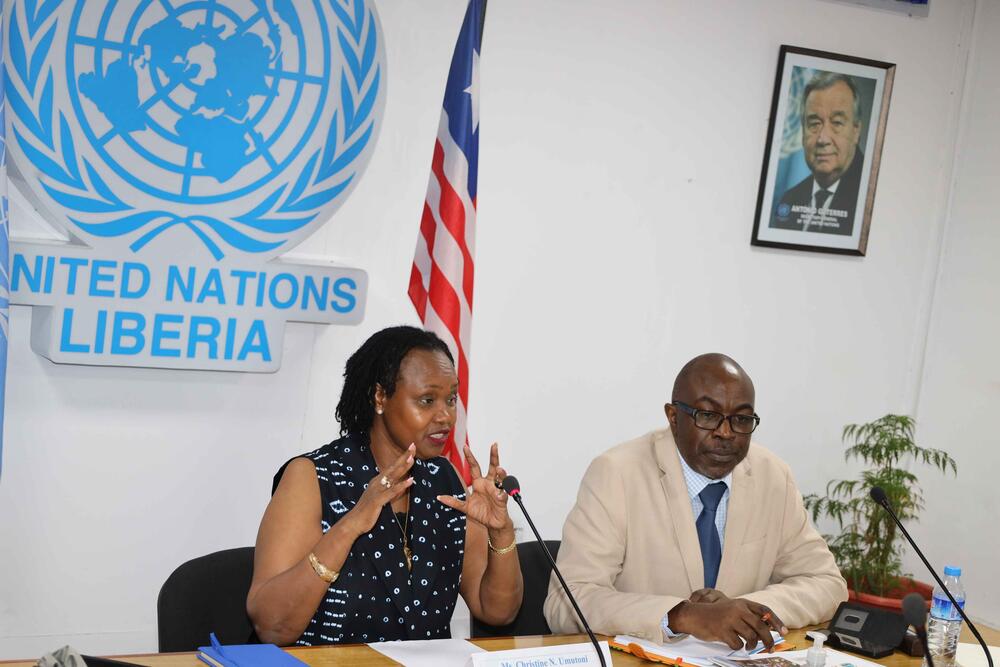Monrovia, Liberia – June 13, 2025 – The UN Resident Coordinator in Liberia, Madam Christine Umutoni convened a briefing meeting with resident Ambassadors of member states on the Executive Boards of UNFPA, UNDP and UNICEF. Resident Embassies at the meeting included the Federal Republic of Germany, India, Kingdom of Sweden, the Republic of Ireland, European Union, United Kingdom, Federal Republic of Nigeria, Cuba, Kingdom of Belgium.
The UN Resident Coordinator said the briefing meeting was intended to update the member states on the status of the Country Programme Documents development of the three UN agencies, highlighting areas of joint efforts. She also noted the alignment of the UN Development cooperation framework with the government of Liberia national development plan, the ARREST Agenda for Inclusive Development (AAID).
Madam Umutoni added that the occasion was important to receive feedback and support from the respective members states on the CPDs that are under review and pending approval of the respective boards.

UNFPA’s Officer in Charge Mr. Leonard Kamugisha utilized the platform to deliver a comprehensive presentation on UNFPA’s 6th Country Programme, which spans the period from 2026 to 2030. His address to the attending ambassadors underscored the pivotal roles of the member states in shaping international development cooperation and partnerships to advance UNFPA’s mandate.
In his presentation, our OIC meticulously outlined the current Liberian context, placing a strong emphasis on the nation’s population dynamics and key socio-economic indicators that concern the mandate of UNFPA of ending preventable maternal deaths, ending the unmet need for family planning, and ending gender-based violence and harmful practices.
Mr. Kamugisha underscored areas where progress in achieving these critical objectives has been limited, thereby highlighting the imperative for robust and strategic partnerships to accelerate positive change.
He suggested that investing in youth and adolescents is crucial for a prosperous Liberia, underscoring the long-term benefits of directing development interventions toward harnessing the full potential of Liberia’s young population.

Our Officer in Charge further elaborated on the central focus of UNFPA’s 6th Country Programme in Liberia, emphasizing its commitment to transforming the sexual and reproductive health and rights of adolescent girls and young women. This strategic priority recognizes the unique vulnerabilities and potential of this demographic group and seeks to empower them through targeted interventions and support.
“In our interventions, we are placing focus on ending preventable maternal deaths, building on the opportunity afforded by the national attention to this crisis,” Mr. Kamugisha further explained, highlighting UNFPA’s commitment to supporting Liberia to realize its vision to meet its maternal health targets, emphasizing that ”We have pockets of success: scale-up and sustainability are crucial to maximize impact”. He emphasized that UNFPA’s programme of action in Liberia is designed to align with the Government of Liberia’s National Development Plan, the “ARREST Agenda for Inclusive Development” (AAID).
The AAID recognizes Liberia’s demographic potential and places emphasis on harnessing the potential of Liberia’s young population, in an effort to drive long-term economic growth and social development. UNFPA’s 6th Programme Cycle is intentionally leaning further in this strategic direction to provide robust support to the Government of Liberia in its efforts to realize the goals outlined in the AAID.
To illustrate UNFPA’s operational engagement, Mr. Kamugisha informed the resident embassies on the boards of the three UN agencies that UNFPA is actively providing crucial technical and logistical support to various key government ministries and institutions. He then outlined the three outputs of the UNFPA new Country Programme. The first output involves strengthening the capacity of institutions and systems to deliver high-quality maternal, sexual, and reproductive health services, with specific focus on adolescent girls and young women. The second centers on empowering national institutions, civil society, and women and youth movements to challenge discriminatory norms and increase the agency of women, adolescents, and youth. Finally, the third output aims to enhance national and subnational capabilities to produce and utilize disaggregated data for informed policy, planning, and budgeting, while also addressing population dynamics and demographic resilience.
Dr. Aliou Mamadou Dia and Mr. Andrew Brooks, Resident Representatives of the United Nations Development Programme (UNDP) and the United Nations Children's Fund (UNICEF) also delivered presentations outlining their respective Country Programmes in Liberia. Their presentations similarly informed the Executive Boards representations about the ongoing and planned activities of each agency and underscored the importance of developing robust and strategic partnerships to enhance their impact.
They also called for strengthened collaboration and increased support directed towards the Government of Liberia. UNDP and UNICEF concluded their presentations by emphasizing that collaborative efforts across various sectors are essential to effectively address the multifaceted development challenges facing Liberia.


